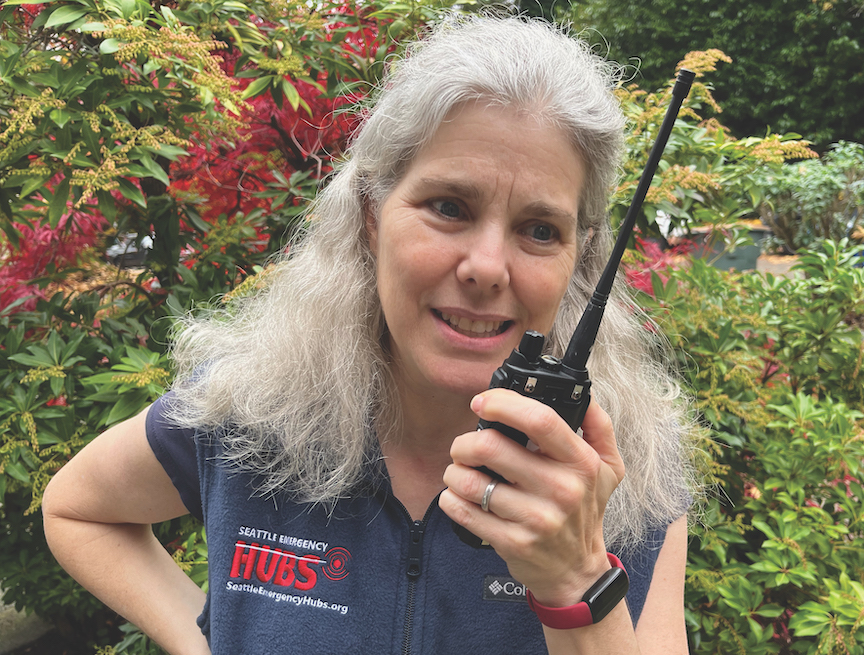June was a busy month, disaster preparedness-wise. Rumble Ready, a citywide drill for Seattle’s Emergency Communications Hubs, ran on two separate weekend days to let volunteers practice responding to a dreaded-but-possible imaginary situation: All of Seattle has been shaken by a 6.1 magnitude earthquake along the Seattle Fault Line. Internet and cell phone services are spotty and unreliable and outside help (especially medical help) might not reach the neighborhood for days.
Getting Rumble Ready
The all-volunteer-run Hubs exist to address just this type of situation. I attended Rumble Ready drills at two different Hubs to hone my disaster prep skills for Madison Park Hub’s own September drill, and had a fab time roleplaying “what if” situations with avid volunteers and willing neighbors. As with usual Hub drills, volunteers sat at tables under canopies and talked to visitors, who helped us practice by reading out prewritten scenarios. We then dealt with the scenarios — sending visitors to the appropriate area to get their information recorded.
To clarify a bit, Hubs are not places you go to get water, food, or medical supplies. People don’t share things at a Hub, but rather, information: Hubs act as a sort of “stand-up bulletin board” to help people make connections (offering and receiving help) after a disaster. In addition to the usual scenarios, Rumble Ready had radio messages come in “from the city”— including information such as hours for an upcoming citywide curfew.
One noteworthy scenario I encountered in my role as a Hub’s Greeter (the first person Hub visitors talk to): a man came up to me (reading his scenario off a slip of paper), saying that his pregnant partner was about to give birth: was there anything we could do?
I sent the man to the Volunteer tent to see if anyone was available to help. Earlier in the drill, we’d had a visit from a (pretend) midwife who let us know she was able to help with any upcoming needs; she’d signed up and left information about how and when she was available. Thus, our Hub was able to “make a match,” which is the kind of achievement we’d love to make in a real-world disaster.
 Dana Armstrong
Dana ArmstrongThe Value of Volunteers
In her book “A Paradise Built in Hell: The Extraordinary Communities That Arise in Disaster,” Rebecca Solnit brands disaster communities as “remarkable societies,” saying that “just as many machines reset themselves to their original settings after a power outage, human beings reset themselves to something altruistic, communitarian, resourceful and imaginative after a disaster, that we revert to something we already know how to do.” I’ve seen neighbors step up to help on my own street during power outages and heavy snowfall; I firmly believe that Seattleites will rise to the occasion in a disaster and that we can—and should—prepare for this abundance of generosity.
Given the value of volunteers to a Hub’s operation, a Hub’s Volunteer Coordinator is a crucial role. The Volunteer Coordinator has several important tasks. One task is making volunteer matches: the aforementioned midwife with expectant parents; shovel-wielding volunteers with neighbors who need vital items in their house uncovered; or a skilled cyclist with someone looking for a missing pet. Another task is scheduling volunteers to work shifts at the Hub itself (and making sure they are taking care of themselves as well as others). And one last task is helping people find places and times to meet up. We are used to being reachable these days, but in a serious disaster, cell phones might not be reliable: a Volunteer Coordinator might instead suggest good times or places to meet (sending volunteers to a shelter to help at mealtimes, for instance).
I hope I’ve conveyed here some of my enthusiasm for Hub volunteering. It’s not only a lot of fun to practice but, in an emergency, will be a potentially valuable way to harness our community’s energy. And there are so many interesting, diverse roles to take on in a Hub: I discussed two other important Hub roles, Greeter and Message Taker in our last issue, and hope to get to Education, Information, and Resources roles next month.
If you’d like to get involved or learn more, get in touch with us at madparkhub@gmail.com—we’re holding a drill at our Hub (next to Madison Park’s tennis courts) on Sunday, Sept. 22 and will need lots of help.
And a postscript for you. I just added a particular timely free disaster app to my phone: the Watch Duty app (for iPhone and Android) is a “wildfire mapping and alert app powered by real people.” Color me intrigued!
Dana Armstrong is a Madison Park Emergency Hub volunteer.